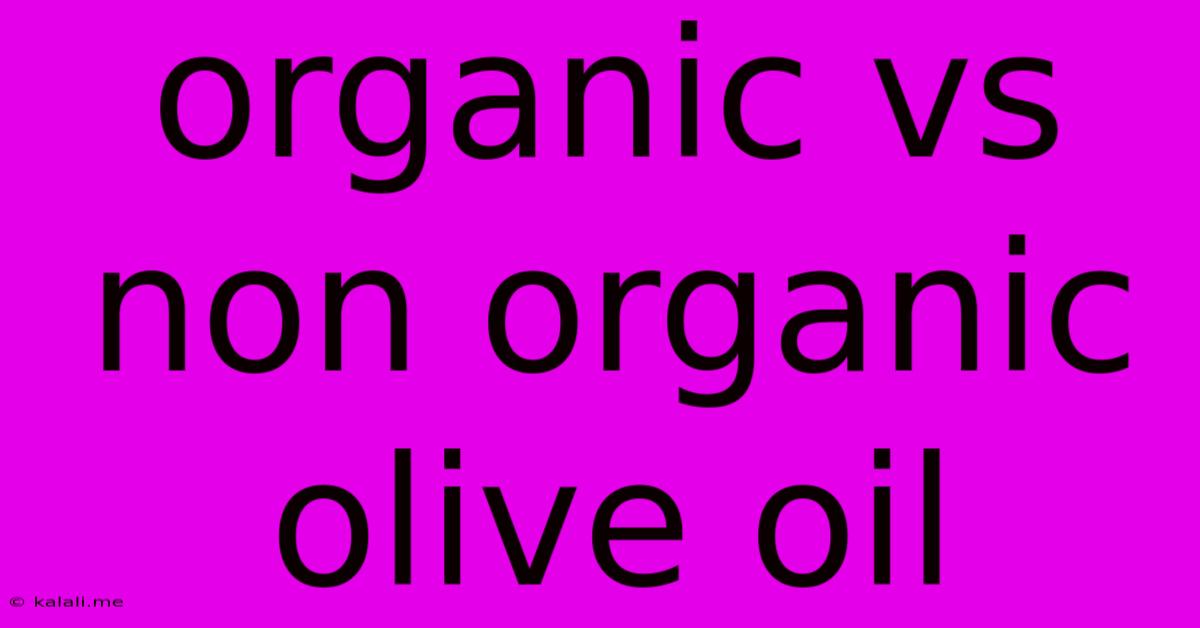Organic Vs Non Organic Olive Oil
Kalali
Jun 10, 2025 · 3 min read

Table of Contents
Organic vs. Non-Organic Olive Oil: A Deep Dive into the Differences
Choosing the right olive oil can feel overwhelming. With so many brands and variations on the shelves, understanding the difference between organic and non-organic olive oil is crucial for making an informed decision. This article explores the key distinctions, helping you determine which type best suits your needs and preferences. We'll delve into production methods, nutritional differences, environmental impact, and ultimately, the taste and quality you can expect.
What Makes Olive Oil "Organic"?
The term "organic" refers to agricultural practices that prioritize environmental sustainability and avoid synthetic chemicals. For olive oil, this means the olives are grown without the use of synthetic pesticides, herbicides, or fertilizers. Organic olive groves also adhere to strict guidelines regarding soil health, water management, and biodiversity. Certification bodies, like the USDA Organic in the US or the EU organic label in Europe, verify that producers meet these rigorous standards. This certification ensures traceability and transparency throughout the entire production process.
Organic vs. Non-Organic: A Side-by-Side Comparison
| Feature | Organic Olive Oil | Non-Organic Olive Oil |
|---|---|---|
| Farming Practices | No synthetic pesticides, herbicides, or fertilizers | May use synthetic pesticides, herbicides, & fertilizers |
| Soil Health | Focus on soil health and biodiversity | May use practices less beneficial for soil health |
| Environmental Impact | Generally considered more environmentally friendly | Potentially higher environmental impact due to chemical use |
| Cost | Typically more expensive | Generally less expensive |
| Nutritional Value | Minimal proven difference in nutritional content | Minimal proven difference in nutritional content |
| Taste | Can vary widely depending on variety and production | Can vary widely depending on variety and production |
Nutritional Value: Are There Real Differences?
While organic farming methods promote healthier ecosystems, the nutritional differences between organic and non-organic olive oil are often minimal and not always consistently proven. Both types provide healthy monounsaturated fats, antioxidants (like polyphenols), and Vitamin E. The variations in nutritional composition are more strongly influenced by factors such as olive variety, harvest time, and extraction methods.
Environmental Considerations: A Greener Choice?
The environmental impact is a significant differentiator. Organic olive oil production minimizes chemical runoff into water sources, reduces soil degradation, and supports biodiversity. Non-organic farming practices, however, can lead to water pollution, soil depletion, and harm to beneficial insects and other wildlife. Choosing organic olive oil is a way to support sustainable agricultural practices and protect the environment.
Taste and Quality: Does Organic Always Mean Better?
The taste and quality of olive oil depend on a multitude of factors—olive variety, harvesting techniques, processing methods, and storage conditions. While some believe organic olive oils often possess a superior flavor profile due to the healthier growing conditions, this isn't always the case. Both organic and non-organic olive oils can be exceptional or subpar, depending on these other contributing elements. Look for extra virgin olive oil, regardless of its organic status, to ensure high quality and superior flavor.
Making Your Choice: Organic or Non-Organic?
Ultimately, the decision of whether to buy organic or non-organic olive oil is a personal one. Consider your priorities: if environmental sustainability is paramount, organic olive oil is a better choice. If budget is a major factor, non-organic olive oil may be more suitable. Regardless of your choice, prioritize extra virgin olive oil from reputable sources for optimal quality and flavor. Pay attention to the label, check for certifications, and look for information about the olive variety and production methods. This will help you navigate the options and find the perfect olive oil for your culinary needs.
Latest Posts
Latest Posts
-
In A Table An Area That Contains Text
Jul 02, 2025
-
64 Ounces Of Water Is How Many Bottles
Jul 02, 2025
-
How Many Days Are In 100 Years
Jul 02, 2025
Related Post
Thank you for visiting our website which covers about Organic Vs Non Organic Olive Oil . We hope the information provided has been useful to you. Feel free to contact us if you have any questions or need further assistance. See you next time and don't miss to bookmark.